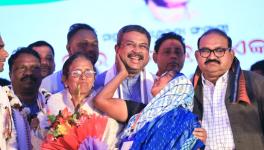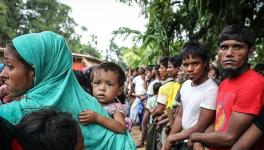Right to Food Campaign Raise Concern Over Centre's 'Misrepresentation' of PMGKAY
Representational Image.
Delhi: The Right to Food Campaign has expressed strong opposition to the central government's recent efforts to portray the National Food Security Act 2013 (NFSA) as their own initiative through the Pradhan Mantri Garib Kalyan Anna Yojana (PMGKAY). The Campaign highlights this as a "misrepresentation" intended to gain political favour rather than addressing the real needs of the public.
In a recent election rally held on November 4, Prime Minister Narendra Modi announced the extension of the 5 kg free ration allocation to the Public Distribution System (PDS) for 80 crore people over the next five years. The announcement has raised concerns about violation of the model code of conduct and unfair use of state machinery to influence voters.
The PMGKAY was initially introduced in April 2020 in response to economic distress caused by the COVID-19 pandemic. It provided an extra 5 kg of free food grains to every ration cardholder, in addition to the existing NFSA entitlement of 5 kg of food grains at subsidised rates, as per Schedule 2 of NFSA 2013.
Consequently, ration cardholders were entitled to 10 kg of ration per person since April 2020 (5 kg under NFSA at a subsidised price and 5 kg free under PMGKAY). However, on December 23 2022, the Union government announced the discontinuation of PMGKAY from January 1, 2023 onwards. Since then, the central government has been referring to the PDS as the Pradhan Mantri Garib Kalyan Anna Yojana to conceal the discontinuation of the additional 5 kg ration, the Campaign pointed out in a press release.
"Since January, the central government has been referring to the Public Distribution System as the Pradhan Mantri Garib Kalyan Anna Yojana to hide the discontinuation of the additional 5 kg ration to every ration card holder," it said.
The government's characterisation of this move as a 'historic' decision has been met with scepticism, as it does not effectively address the soaring prices of various food commodities. The actual savings per person due to the NFSA ration being made free is estimated to be only around Rs 11 per month.
Meanwhile, independent field surveys have revealed that many vulnerable households remain excluded from the public distribution system, as quotas and coverage have not been revised for more than 12 years despite population growth.
It is estimated that over 10 crore of India's most marginalised citizens lack ration cards, the Campaign said. It noted that the Supreme Court, in an order dated April 20 2023, has directed all State/UT governments to issue ration cards under the NFSA to the 8 crore persons who are registered on the eShram portal but do not possess ration cards. Yet, no state or union territory government has taken steps to implement this order.
Furthermore, the foodgrain allocation to ration card holders is limited to cereals, excluding essential commodities such as dal, cooking oil, and vegetables, which have lately seen steep price increases in the market. The rise in food prices is contributing to poor nutritional conditions, particularly among women and children, due to a lack of dietary diversity, the Campaign said.
The Right to Food Campaign emphasised the need to universalise the PDS and expand the food basket to include dal and cooking oil. They also called for increased provisions for women and children under ICDS and MDM, as well as the inclusion of eggs for additional nutrition.
The Campaign also advocated for the constitutional guarantee of the NFSA as a legal entitlement to ensure food and nutritional security for every Indian citizen, rather than a political promise or handout.
Get the latest reports & analysis with people's perspective on Protests, movements & deep analytical videos, discussions of the current affairs in your Telegram app. Subscribe to NewsClick's Telegram channel & get Real-Time updates on stories, as they get published on our website.
























